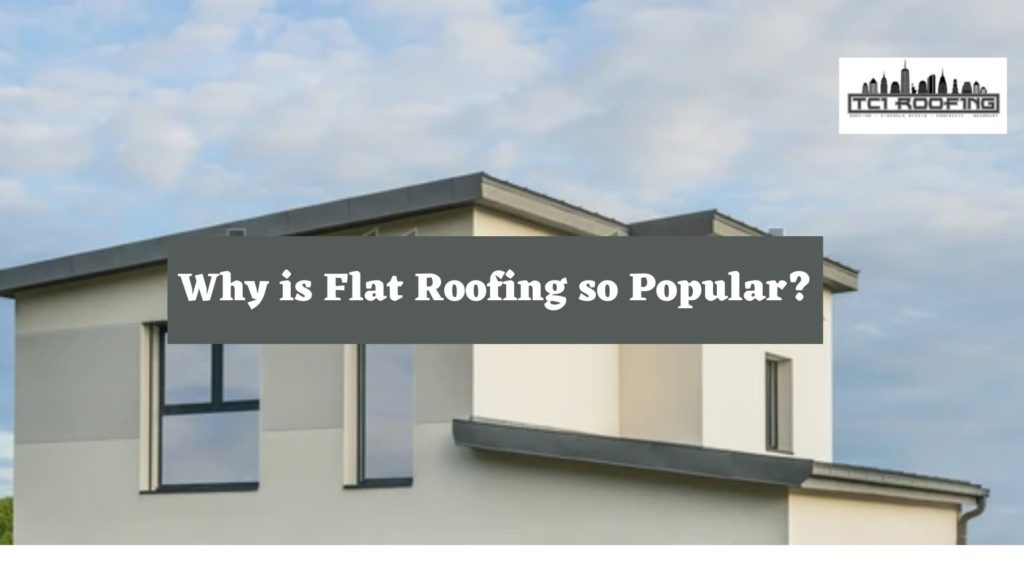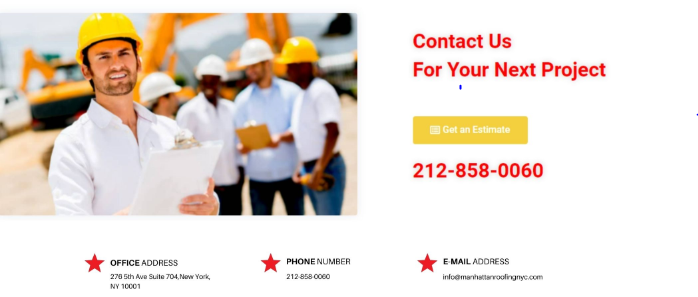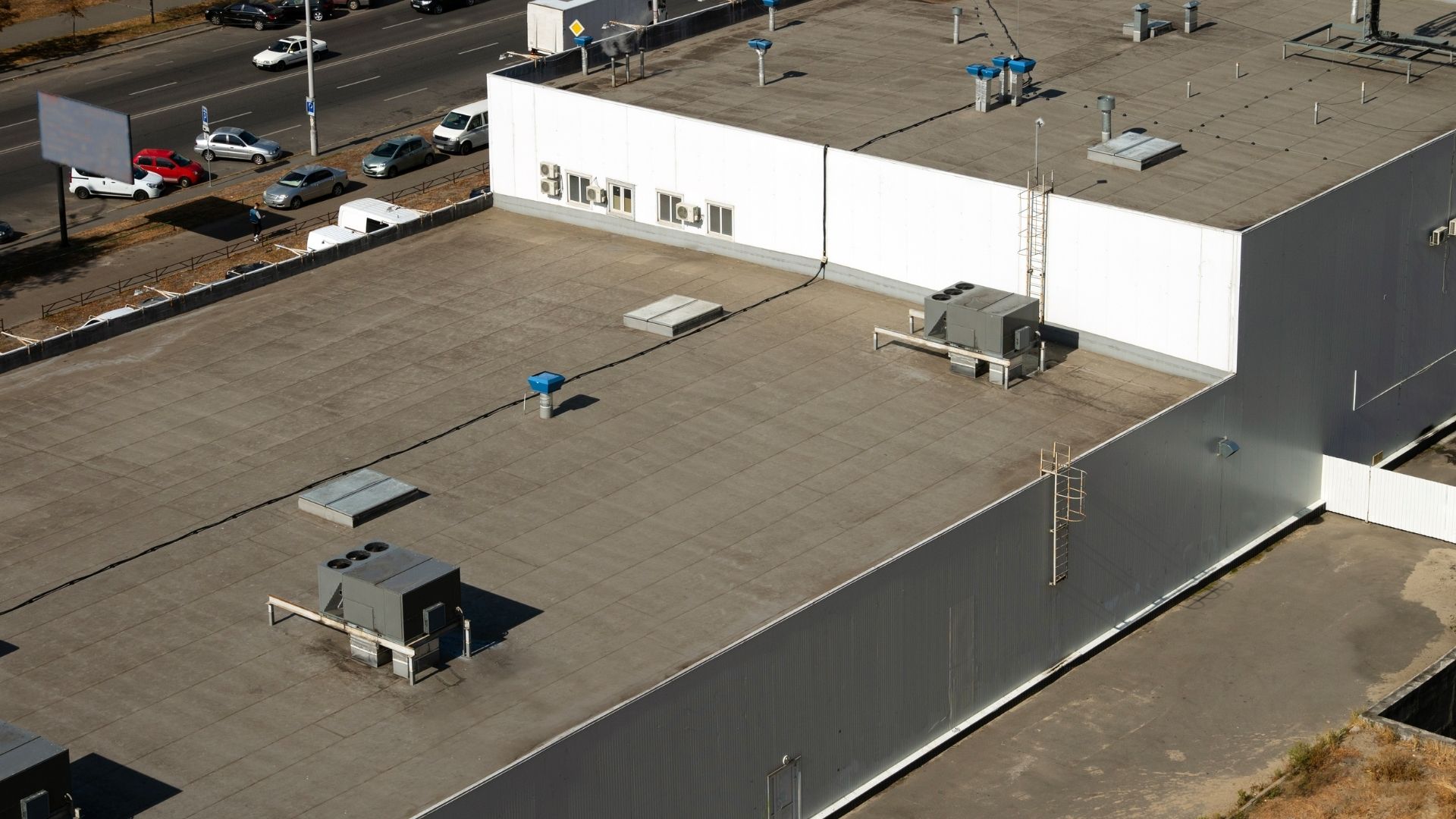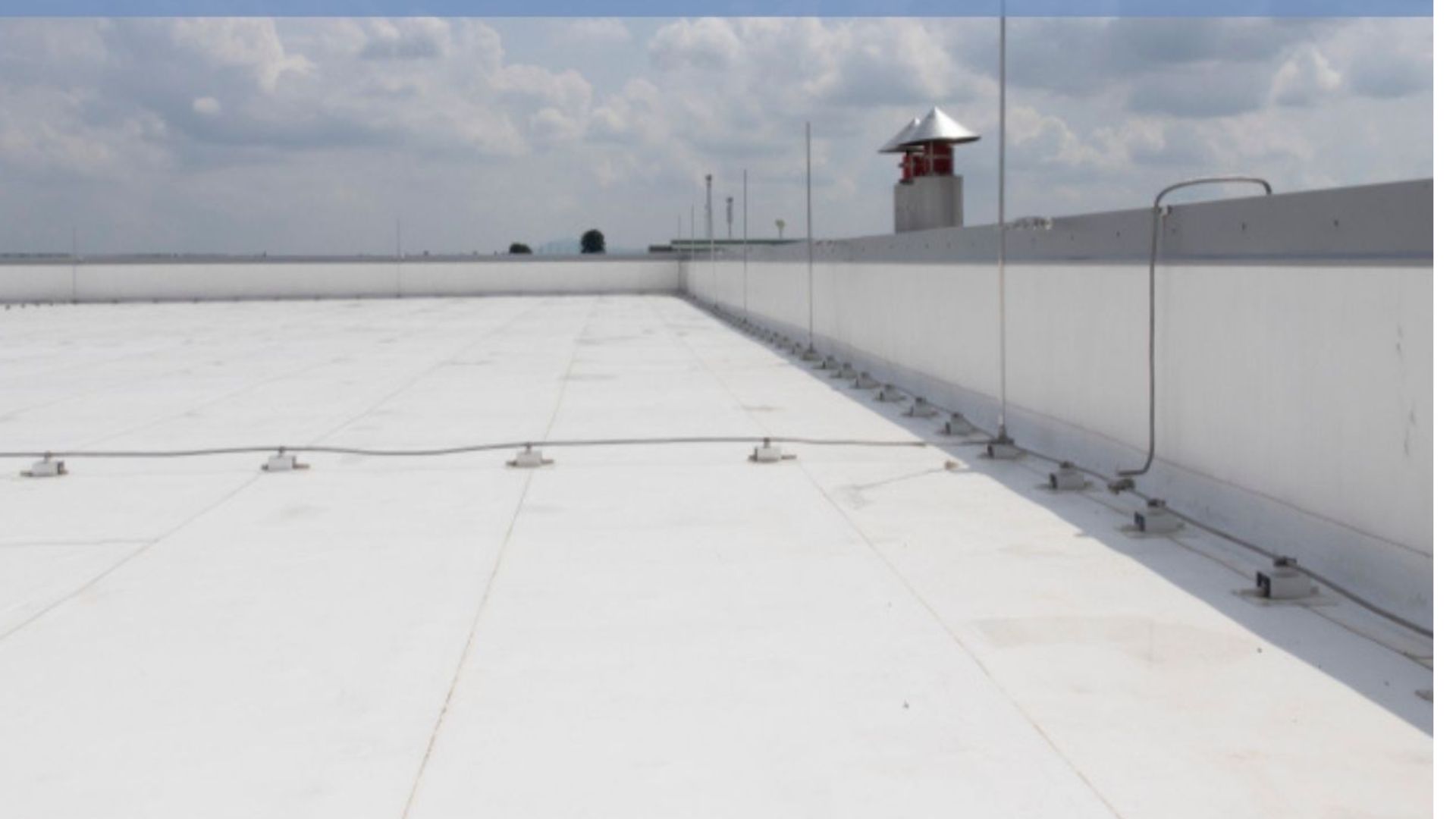There are several reasons why flat roofing is so popular, especially in commercial and industrial settings:
- Flat roofs are incredibly durable and can last for decades with proper maintenance.
- Flat roofs are relatively easy and inexpensive to install, repair, and replace.
- Flat roofs offer several benefits in terms of energy efficiency and environmental friendliness.
Flat roofs are durable because they don’t have any protrusions or valleys that can collect water and snow, leading to leaks and other problems. Flat roofs are also easy to inspect and repair since there’s no need to climb onto the roof or use special equipment.
What is Asphalt Flat Roofing?
Asphalt flat roofing is one of the most popular types of flat roofing material. It’s made from a combination of asphalt and reinforcing materials like fiberglass or organic felt. Asphalt flat roofs are incredibly durable and can last up to 20 years with proper maintenance.
They are also easy to install and repair, which makes them a popular choice for commercial and industrial buildings. Asphalt flat roofs are also environmentally friendly since they can be recycled at the end of their lifespan. Flat roof materials are suitable for an inclusive flat roof design also like for built-up roofs and flat roof replacement.
Why Are Flat Roofing Systems a Popular Choice for Homes?
Flat roofing systems are popular for homes because they offer several advantages over traditional pitched roofs. Flat roofs are more durable and require less maintenance than pitched roofs. They are also more energy efficient since they don’t have any valleys or protrusions that can collect snow and ice. Additionally, flat roofs are easier to install and repair than pitched roofs.
Due to more contemporary housing constructions’ adoption of flat roofing technologies, flat roofing is currently witnessing another resurgence. Flat roofs are an excellent way to economize on pricey roofing materials with as many advantages as pitched roofing.
In addition to roofs, flat roofing has other applications. Some people have chosen to install skylights to bring in more natural light. Some people have expanded their living rooms by building decks and lounge areas on their flat roofs. Finally, some people have made their roofs a little more environmentally friendly by adopting living roofs or adding solar panels.
Materials used to construct flat roofs include EPDM, PVC, TPO, modified bitumen, BUR, and metal. Depending on your chosen material modified bitumen roofing for your flat roof may be much more affordable to install than a pitched roof. Additionally, flat roof maintenance is much simpler and less expensive.
Why is Flat Roofing a Good Choice for Commercial Buildings?
Flat roofing is a good choice for commercial buildings because it offers several advantages over traditional pitched roofs. Flat roofs are more durable and require less maintenance than pitched roofs. They are also more energy efficient since they don’t have any valleys or protrusions that can collect snow and ice. Additionally, flat roofs are easier to install and repair than pitched roofs.
Commercial buildings are often large and complex, making roof maintenance difficult and expensive. Flat roofs simplify roof maintenance and reduce the overall cost of ownership. In addition, flat roofs offer better energy efficiency thanks to their lack of valleys and protrusions. This can lead to significant savings on energy costs over the roof’s lifetime.
Several flat roofing materials include EPDM, PVC, TPO, modified bitumen, BUR built-up roof, and metal. Each type of material has its advantages and disadvantages. However, all flat roofing materials are more affordable to install and maintain than traditional pitched roofs.
How Much Do Flat Roofing Services Charge for a Flat Roof?
The cost of flat roofing services varies depending on the size and complexity of the roof, the type of material used, and the property’s location. However, on average, flat roofing services charge between $2 and $4 per square foot. This is significantly cheaper than traditional pitched roofs, costing between $5 and $12 per square foot.
Flat roofing is a popular choice for commercial and industrial buildings because it offers several advantages over traditional pitched roofs. Flat roofs are more durable and require less maintenance than pitched roofs. They are also more energy efficient since they don’t have any valleys or protrusions that can collect snow and ice. Additionally, flat roofs are easier to install and repair than pitched roofs.
Contact a local roofing contractor for a free estimate if you’re considering flat roofing for your commercial or industrial building. You can expect to pay between $2 and $4 per square foot for flat roofing services. This is significantly cheaper than traditional pitched roofs, modified bitumen roof costing between $5 and $12 per square foot.
How to Determine the Best Commercial Flat Roofing System for You?
Many different types of commercial flat roofing systems are available on the market. Therefore, it can be challenging to determine which method is best for your building. Factors to consider include the climate, the type of building, and the budget.
The most common type of commercial flat roofing system is EPDM. EPDM (ethylene propylene diene) is a synthetic rubber that is resistant to sunlight, heat, and cold. It is also very durable and easy to repair. PVC is another popular type of flat roofing system. PVC is a plastic that is resistant to sunlight, heat, and cold. However, it is not as durable as EPDM and can be more challenging to repair.
Metal and asphalt are two other common types of flat roofing systems. Metal roofs are very durable but can be very noisy. Asphalt roofs are less stable but are much quieter.
The best commercial flat roofing system for your building depends on the climate, the type of building, and the budget. However, EPDM and PVC are two of the most popular flat roofing systems or membrane roof. They are both resistant to sunlight, heat, and cold and are easy to repair. Contact a local roofing contractor to discuss the best system for your building.
How Much Does Flat Roofing Installation Cost?
A professional roofer can guarantee that your flat roof is installed to the highest standard, lowering the likelihood that repairs will be necessary in the future. But how much would flat roofing installation cost you?
The size of the area that needs roofing and your location will affect the cost of installing a flat roof. Although there isn’t a set price for building a flat roof, the following table provides an overview of typical flat roofing installation expenses.
Why Should You Hire a Professional Flat Roofing Contractor in Manhattan?
Flat roofs offer several advantages as one of the most popular roofing choices for both commercial and industrial buildings. They’re more durable and require less maintenance than traditional pitched roofs, making them a more cost-effective option in the long run. Additionally, flat roofs are easier to install and repair than steeply pitched roof.
If you’re considering flat roofing for your commercial or industrial building, hiring a professional contractor with experience with this type of roofing is essential. There are many different types of flat roofs, each with its unique installation requirements. A professional contractor will be able to recommend the best type of roof for your building and ensure that it’s installed properly.
Hiring a professional contractor is also essential because flat roofing can be dangerous if it’s not installed correctly. Flat roofs are more susceptible to wind damage than pitched roofs, so it’s important to ensure they’re properly secured. A professional contractor will have the necessary equipment and experience to install your flat roof properly.
With the risk of damage to your property in Manhattan, several professional flat roofing contractors can help you with your roofing project. Contact a local roofing company and ask for recommendations to find a contractor who is right for you. Once you’ve found a few contractors, ask about their experience with flat roofs and get estimates for your project. With a little research, you can find a professional contractor who will provide you with the high-quality flat roof you need.
Is Asphalt Flat Roofing Better?
Asphalt flat roofing is a popular choice for many commercial and industrial buildings because of its durability, low maintenance, and easy installation. Asphalt roofs are also less expensive than other flat roofs, making them a more budget-friendly option. The original shingles underwent several improvements over time before becoming the asphalt roof shingles we know today. Asphalt roofing is the process of attaching these durable asphalt shingles to buildings’ roofs.
Thoughts
Asphalt flat roofing is one of the most popular types of flat roofing material. It’s made from a combination of asphalt and reinforcing materials like fiberglass or organic felt. The best commercial flat roofing system for your building depends on the climate, the type of building, and the budget. However, EPDM and PVC are two of the most popular flat roofing systems. They are both resistant to sunlight, heat, and cold and are easy to repair. With a little research, you can find a professional contractor who will provide you with the high-quality flat roof you need.





